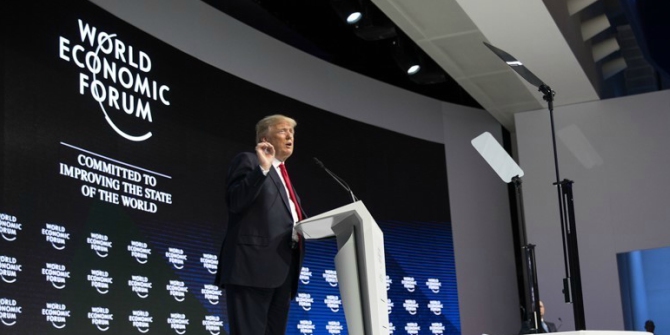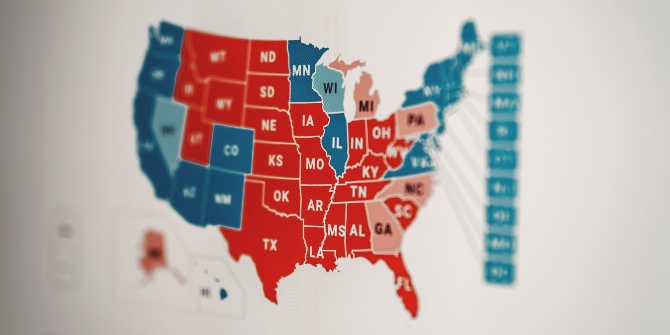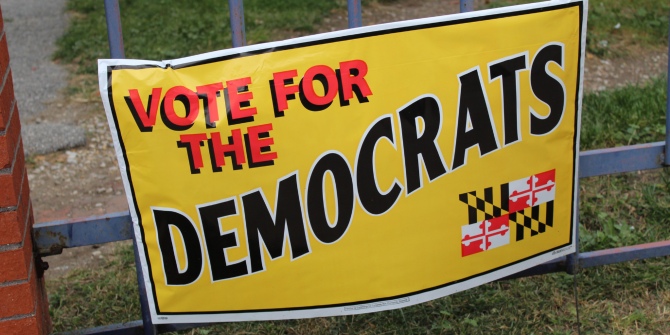 The report from Special Counsel Robert K. Hur into the treatment of classified material by President Joe Biden was released in February, leading to media cycles dominated by coverage of, and comment on, Hur’s findings. Below Peter Finn, highlights some notable aspects of the report and reflects on how it may feed into the 2024 presidential election.
The report from Special Counsel Robert K. Hur into the treatment of classified material by President Joe Biden was released in February, leading to media cycles dominated by coverage of, and comment on, Hur’s findings. Below Peter Finn, highlights some notable aspects of the report and reflects on how it may feed into the 2024 presidential election.
- This article is part of ‘The 2024 Elections’ series curated by Peter Finn (Kingston University). Ahead of the 2024 election, this series is exploring US elections at the state and national level. If you are interested in contributing to the series, contact Peter Finn (finn@kingston.ac.uk).
The report from Robert K Hur, with the unwieldy official title Report on the Investigation Into Unauthorized Removal, Retention, and Disclosure of Classified Documents Discovered at Locations Including the Penn Biden Center and the Delaware Private Residence of President Joseph R. Biden, Jr, released in February 2024 is interesting as a primary source in and of itself as it explains the reasoning behind the decision not to bring charges against President Joe Biden related to his treatment of classified material. However, it is also likely to be mined for evidence for use in campaigning against Biden in the lead up to the presidential election in November. Here are five aspects of the report and a look forward to what, if anything, it might mean for the 2024 presidential election:
1. The report counters some of the mystique around the Official Record
As I explore in a forthcoming volume co-edited with Robert Ledger, the official records of states are complex and ever evolving, providing details on key state actions and a version (though not necessarily the version) of history. What makes the report from Hur particularly interesting in the study of the US official record is that the focus of the report itself is the treatment of the official record by Biden whilst he was a senator, the Vice President, a private citizen (if such a term could really apply to a former senator and vice president), and then President.
As the report details, portions of the US official record are designated with labels such as Confidential, Secret, and Top Secret. Such labels designate protocols related to who has access, how, and where such material can be viewed. Some material, for instance, needs to be viewed in a so-called Sensitive Compartmented Information Facility. Together, such restrictions and labels, along with the ever-growing genre of TV and films that focus on the arena of national security, provide an air of mystique around such portions of the official record. Yet, the details in the report of notebooks containing classified information being found in a ‘file cabinet under printers’ does quite a bit to counter this mystique. The same also goes for the picture of boxes of documents piled up in a bathroom that was taken at Donald Trump’s property in Mar-a-Lago, Florida.
2. The decision not to bring charges did not relate to presumption of presidential immunity.
In 2019 Special Counsel Robert Mueller explained his decision not to bring charges against Trump in relation to his investigation into Russian interference in the 2016 election as being in line with the general precedent of not bringing criminal charges against sitting presidents. As such, Mueller’s report, with the full name Report on the Investigation into Russian Interference in the 2016 Presidential Election, concluded that although the investigation had collected evidence ‘about the President’s actions and intent’ that ‘would need to be resolved’ had there been an attempt to make a ‘traditional prosecutorial judgement’, it did not need to do so as Mueller ‘determined not to make’ such a judgement. This led to the slightly odd final sentence that stated that ‘while this report does not conclude that the President committed a crime, it also does not exonerate him’. The decision not to make a prosecutorial judgement was based on a 2000 Department of Justice memo, itself based on two memos from the 1970s, that creates a presumption against bringing criminal charges against a sitting president. Pointedly, however, Hur made clear that his decision not to bring charges against Biden did not relate to this presumption or the broader legal arguments in the Department of Justice memo.
3. Material for Biden’s critics
For anyone with even half an ear on the news coverage that accompanied the release of the report, it was impossible to miss the much-repeated characterisations from Hur of Biden that the president was hampered by a poor memory. Such depictions have been strongly and continually rejected by Biden and his supporters, yet it is certain that the assertions ‘Mr. Biden’s memory was significantly limited […] in his interview with our office’ will feature heavily in Republican advertising in the build up to the presidential election.
Interestingly, Vox reporting on the interview transcripts that fed into the report appear to lend weight to the counter-claims from the Biden team that the portrayal of the decline of Biden’s critical faculties had been ‘cherry-picked and exaggerated’.

“P20230213AS-0079-2” by The White House is United States government work
4. The distinction between Trump and Biden
Like Biden, Trump was found to have had classified material in his possession that he should not have done. Yet, Trump has dealt with it in a very different manner. Where Biden reported the initial materials that were found, and then allowed access to his properties to facilitate an investigation, Trump refused to return classified material and, according to Special counsel Jack Smith, has been ‘relentless and misleading’ in his attempts to obstruct the case Smith has brought against him. As such, the approach taken by the former (and perhaps future) president and the current president have been very different.
5. The report will feed into history rhetorically as well as empirically.
As with any significant government report, Hur’s will be mined for insights and evidence by students of the US presidency. Yet it also contains turns of phrase that suggest it was written with at least one eye on the historical record. One presumes the term ‘presidential timber’, used to capture Biden’s image of himself, will see a revival. One imagines that emails have already gone into editors by authors writing about Biden in particular, or the presidency in general, looking for a hook that might see their book sell a few more copies.
The 2024 Presidential Election
As noted above, Hur’s report contains evidence for those who wish to elevate age related criticisms of Biden. Yet, the pushback from Biden and his supporters was immediate and forceful. Moreover, Biden’s opponent is almost as old as the incumbent president himself and consistently acts in a manner that is off-putting to some voters. As such, rather than being a turning point in perceptions of Biden or playing an important role in the election in and of itself, it has, and will likely continue to be, used to reinforce negative views of the president as we move closer to the election in November.
- Please read our comments policy before commenting.
- Note: This article gives the views of the author, and not the position of USAPP – American Politics and Policy, nor the London School of Economics.
- Shortened URL for this post: https://wp.me/p3I2YF-dIj






